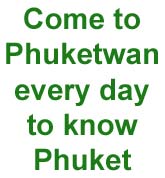BEING a Thai guide with a second language on a resort island like Phuket pays fairly good money. There are about 2000 guides, who mostly accompany package tours on buses and minivans.
English and Mandarin are the most in-demand second languages for Thai guides, with about 300 guides in each category.
The best guides are the ones who have a natural aptitude for a second language and who enjoy travelling with a group and talking about life in Thailand, as well as the places they visit.
The experts say that those who do it just for the money never really make the best guides.
With the changes in patterns of visitors, some languages become useful quickly while there can sometimes be too many guides and not enough customers, or too many customers and not enough guides, depending on the language involved or the time of the year.
People can start studying a second language early on, at school, or take a course at college, or at a language school. Others study with friends or even go to another country for an intense course.
Mostly, it's about the ability of the person to learn new languages. A few people have an ear for languages, and go on to learn two or more.
The Phuket Guides Association protects the interests of Thai guides on the island. Their view is that Thai guides are the ones best equipped to explain aspects of the culture and lifestyle of their country to visitors.
The travel industry, though, is complicated by commercial interests. While most tour companies from most countries see the value in employing local guides for their local knowledge, that's not always the case.
Package tours from Korean and Russia regularly provided home-country guides, even though their knowledge of Thailand is seldom as complete and often learned in Moscow or Seoul.
Protests by Thai guides specialising in the Korean language eventually led in 2007 to a settlement with the Korean tour companies.
Thai guides now sit for a written and spoken test that gives them the qualifications that the tour operators consider necessary to act as guides for Korean visitors.
it has been a long time coming but in late 2007, Kim Tae Weon of the Korean Association concluded a deal with Vice Governor Worapoj Ratthasima that guarantees Thai guides will work for 33 Korean tour companies in future.
There are about 50 Korean tour companies and about 200,000 Korean tourists who visit each year.
The Memo of Understanding requires Thais guide to upgrade their skills in Korean language and Korean culture.
A total of 146 Thais registered interest in taking a written and spoken test, with 107 actually sitting for it.
Only 20 jobs have been approved for now, ands those are on a trip-by-trip basis rather than fulltime.
More than 60 Thais are continuing to study in the hope they will measure up. Thai authorities estimate that there could be as many as 400 tour guides from Korea on the island.
The final debate came when Koreans objected to the tests, believing that the examination wasn't rigorous enough. Their protests were eventually dismissed.
About 1500 Koreans are estimated to have jobs, mostly associated with the tourist industry, and to be based on Phuket.
In December, 2007, flights were scheduled to come to Phuket direct from Korea, indicating the scale of the market. Most visitors stay four days and three nights on the island.
While Koreans have a reputation for being good spenders, much of the money spent on package tours goes to Korean businesses.
There is a growing market opening up, however, for Korean newlyweds.
Some island resorts now niche-market almost exclusively to Korean honeymooners, including the newly opened luxury Villa Zolitude in Chalong, where packages start from above 30,000 baht a night.
Similar issues are now arising with package tours from Russia, an increasingly important market for Phuket's future as a prosperous destination.
Russia's economy, based on oil and gas reserves and a growing number of middle class travelers, is expanding rapidly.
But while healthy competition is being embraced in some areas, travel package tours to Phuket from Russia continue to come with Russian guides.
While some Thai guides are able to work occasionally, they report increasing problems with their Russian counterparts and some tour companies.
Their main concern is that tourists are not getting the same standard of information as tours where Thai guides are involved.
But they fear a backlash if the issue grows to become a conflict.
The Russian tourist industry has a handful of large players and, while Russian tourists generally like Phuket and often return for a second holiday, the tour companies have the power to simply promote other destinations.
And that's the problem for someone who wants to learn Russian. That country is sending tourists to Thailand in increasing numbers.
But there won't necessarily be an increasing number of jobs for Thais as guides.
English and Mandarin are the most in-demand second languages for Thai guides, with about 300 guides in each category.
The best guides are the ones who have a natural aptitude for a second language and who enjoy travelling with a group and talking about life in Thailand, as well as the places they visit.
The experts say that those who do it just for the money never really make the best guides.
With the changes in patterns of visitors, some languages become useful quickly while there can sometimes be too many guides and not enough customers, or too many customers and not enough guides, depending on the language involved or the time of the year.
People can start studying a second language early on, at school, or take a course at college, or at a language school. Others study with friends or even go to another country for an intense course.
Mostly, it's about the ability of the person to learn new languages. A few people have an ear for languages, and go on to learn two or more.
The Phuket Guides Association protects the interests of Thai guides on the island. Their view is that Thai guides are the ones best equipped to explain aspects of the culture and lifestyle of their country to visitors.
The travel industry, though, is complicated by commercial interests. While most tour companies from most countries see the value in employing local guides for their local knowledge, that's not always the case.
Package tours from Korean and Russia regularly provided home-country guides, even though their knowledge of Thailand is seldom as complete and often learned in Moscow or Seoul.
Protests by Thai guides specialising in the Korean language eventually led in 2007 to a settlement with the Korean tour companies.
Thai guides now sit for a written and spoken test that gives them the qualifications that the tour operators consider necessary to act as guides for Korean visitors.
it has been a long time coming but in late 2007, Kim Tae Weon of the Korean Association concluded a deal with Vice Governor Worapoj Ratthasima that guarantees Thai guides will work for 33 Korean tour companies in future.
There are about 50 Korean tour companies and about 200,000 Korean tourists who visit each year.
The Memo of Understanding requires Thais guide to upgrade their skills in Korean language and Korean culture.
A total of 146 Thais registered interest in taking a written and spoken test, with 107 actually sitting for it.
Only 20 jobs have been approved for now, ands those are on a trip-by-trip basis rather than fulltime.
More than 60 Thais are continuing to study in the hope they will measure up. Thai authorities estimate that there could be as many as 400 tour guides from Korea on the island.
The final debate came when Koreans objected to the tests, believing that the examination wasn't rigorous enough. Their protests were eventually dismissed.
About 1500 Koreans are estimated to have jobs, mostly associated with the tourist industry, and to be based on Phuket.
In December, 2007, flights were scheduled to come to Phuket direct from Korea, indicating the scale of the market. Most visitors stay four days and three nights on the island.
While Koreans have a reputation for being good spenders, much of the money spent on package tours goes to Korean businesses.
There is a growing market opening up, however, for Korean newlyweds.
Some island resorts now niche-market almost exclusively to Korean honeymooners, including the newly opened luxury Villa Zolitude in Chalong, where packages start from above 30,000 baht a night.
Similar issues are now arising with package tours from Russia, an increasingly important market for Phuket's future as a prosperous destination.
Russia's economy, based on oil and gas reserves and a growing number of middle class travelers, is expanding rapidly.
But while healthy competition is being embraced in some areas, travel package tours to Phuket from Russia continue to come with Russian guides.
While some Thai guides are able to work occasionally, they report increasing problems with their Russian counterparts and some tour companies.
Their main concern is that tourists are not getting the same standard of information as tours where Thai guides are involved.
But they fear a backlash if the issue grows to become a conflict.
The Russian tourist industry has a handful of large players and, while Russian tourists generally like Phuket and often return for a second holiday, the tour companies have the power to simply promote other destinations.
And that's the problem for someone who wants to learn Russian. That country is sending tourists to Thailand in increasing numbers.
But there won't necessarily be an increasing number of jobs for Thais as guides.




